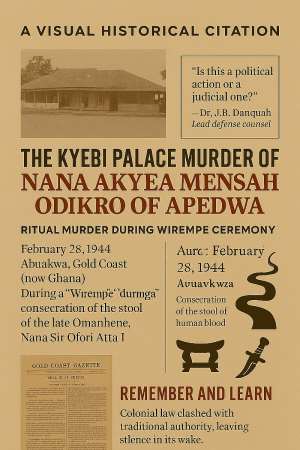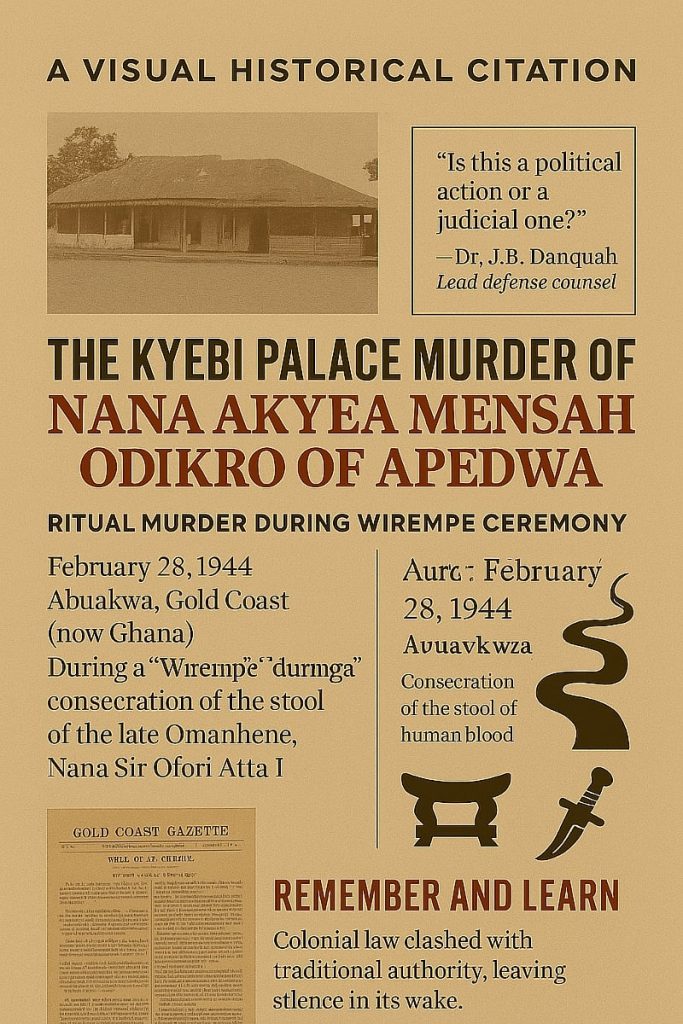
Ghana’s path to independence is paved with stories of resistance, intellect, and vision. But there are darker chapters too—ones cloaked in ritual, secrecy, and political tension. Among them, the Kyebi Palace murder of 1944 remains one of the most chilling and under-discussed events in Ghanaian history. Its eerie silence in public memory is matched only by the brutal nature of the crime itself—a murder that raised complex questions about tradition, justice, and colonial power.
📜 A Ritual Crossed by Blood
The Wirempe ritual in Akyem Abuakwa was sacred. It was meant to consecrate the stool of a departed Omanhene, invoking ancestral strength with offerings of animal blood, soot, and eggs. But on February 28, 1944, this tradition took a macabre turn.
Nana Akyea Mensah, the Odikro of Apedwa, was allegedly murdered during the ritual—drugged, stabbed through the cheeks to silence him, and dismembered. His blood was reportedly collected to blacken the stool, and his body buried beneath a diverted stream to erase the evidence.
It was no ordinary crime. It was ritualistic, symbolic, and politically explosive.
⚖️ Trial in the Colonial Spotlight
When colonial authorities intervened, the case sparked a high-profile trial in Accra. Those accused included prominent Akyem elders and traditional officeholders:
Asare Apietu, Abontendomhene
Kwesi Pipim and Kwame Kagya, royal drummers
Kweku Amoako-Atta, head of the Native Authority Police
The defence was led by none other than Dr. J.B. Danquah, a nationalist icon and member of the royal family. His legal team included Edward Akufo-Addo (future Chief Justice and President), Sarkodie-Addo, and Nii Armaah Ollenu. The stakes were high—not only for the accused but for the traditional institution itself.
After weeks of testimony and deliberation, the jury returned a unanimous verdict: guilty. Yet for many Ghanaians, questions lingered. Was the trial fair? Was it politically manipulated by colonial interests? Did tradition collide fatally with modern justice?
🧠 Why This Case Still Matters
This murder wasn’t just an isolated act—it exposed deep tensions:
Colonial governance vs. indigenous authority
Law vs. ritual
Modern justice vs. traditional silence
In the words of historian Prof. Kwaku Osei, “Kyebi was a microcosm of the Gold Coast—where power, blood, and symbolism collided. We cannot build a future if we forget the shadows of our past.”
🔍 The Silence That Followed
Perhaps most striking is how silent Ghana has been about this case. Biographies of Dr. Danquah seldom mention it. Civic education curricula leave it untouched. It’s buried—much like the body of Nana Akyea Mensah—beneath streams of national pride and polished history.
But remembering it isn’t about shame—it’s about learning.
📣 Call to Action: Let History Speak Again
If Ghana is serious about building an engaged and informed citizenry, civic education must revisit uncomfortable truths. The Kyebi Palace murder should be taught—not to sensationalize, but to illuminate:
The dangers of unchecked power
The need for transparency in governance
The importance of honoring tradition ethically
Let us open the archives. Let us invite discussion. Let us teach—not just the victories of Ghana’s independence, but the moral and political dilemmas along the way.
As we reflect on national identity and democracy, this story is not a footnote—it’s a chapter waiting to be read.
🎬 Blood and Silence: The Forgotten Justice of Kyebi Palace
Set against the haunting backdrop of colonial Gold Coast, this reimagined historical drama invites the international film industry to unravel one of Africa’s most cryptic and powerful murder trials. The 1944 ritual killing of Nana Akyea Mensah, Odikro of Apedwa, during the sacred Wirempe ceremony at Kyebi Palace, offers gripping cinematic potential—with royal tension, ancestral tradition, and political betrayal interwoven into every frame. Intriguingly, the murdered Odikro bore an uncanny resemblance to a prominent Ghanaian lawyer and former Member of Parliament, fueling whispers of legacy and reincarnation that could be explored in dramatic flashbacks. With courtroom clashes led by the formidable Dr. J.B. Danquah and the subtle entanglements of colonial powers like Churchill’s Britain, this story cries out for an emotionally charged, globally resonant film that confronts justice, memory, and the cost of silence.
Retired Senior Citizen
Teshie-Nungua
[email protected]


